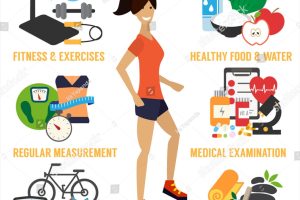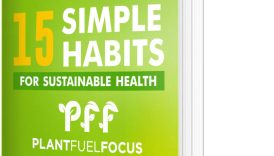From Good to Great: Elevating Your Lifestyle Choices

In today’s fast-paced world, achieving a healthy and fulfilling lifestyle can often feel overwhelming. With so much information available about wellness, nutrition, and self-care, it might be challenging to know where to start. However, making conscious lifestyle choices is essential for leading a life that not only prioritizes physical health but also nurtures mental well-being.
- From Good to Great: Elevating Your Lifestyle Choices
- Why Lifestyle Choices Matter
- The Ripple Effect
- Understanding Lifestyle Choices
- Importance of Healthy Habits
- Impact of Positive Mindset
- Improving Physical Health
- Exercise Routine
- Balanced Nutrition
- Enhancing Mental Well-being
- Stress Management Techniques
- Mindfulness Practices
- Cultivating Healthy Relationships
- Communication Skills
- Setting Boundaries
- Engaging in Personal Development
- Lifelong Learning
- Goal Setting Strategies
Why Lifestyle Choices Matter
Many people underestimate the power of simple daily habits. A few years ago, a friend of mine embarked on a journey to improve their lifestyle. They began by integrating small changes – swapping soda for water and scheduling regular walks. The results were remarkable; not only did they lose weight, but they also felt more energetic and motivated. This transformation emphasizes the significance of lifestyle choices:
- Smarter decisions lead to healthier outcomes.
- Consistent habits can replace negative cycles.
- A positive mindset enhances overall satisfaction in life.
The Ripple Effect
What’s fascinating about making lifestyle changes is the ripple effect that follows. When one aspect of health is improved—like physical fitness—it often influences other areas. Increased physical activity can lead to better sleep, improved mood, and even stronger relationships. In summary, taking deliberate steps toward a healthier lifestyle is an ongoing journey that requires commitment and determination. Embracing these choices can pave the way for a well-rounded life filled with vitality and purpose. With a solid understanding of lifestyle choices, we can explore how improving physical health plays a pivotal role in this holistic approach to well-being.
Understanding Lifestyle Choices
In the quest for a healthier and more fulfilling life, understanding lifestyle choices is crucial. The decisions we make every day, from what we eat to how we manage stress, shape our overall well-being. This section will highlight the importance of healthy habits and the profound impact a positive mindset can have.
Importance of Healthy Habits
Healthy habits serve as the building blocks of a vibrant life. They are not merely fleeting trends; rather, they are essential practices that can significantly enhance quality of life. For instance, consider someone who opts for a morning routine that includes breakfast, exercise, and hydration. This combination can lead to:
- Increased energy levels throughout the day
- Improved concentration and productivity
- Better emotional regulation
Reflecting on my own routine, I remember a time when I consistently skipped breakfast. It left me feeling lethargic and unfocused by mid-morning. Once I incorporated a nutritious breakfast rich in protein and healthy fats, my energy levels skyrocketed, highlighting just how vital healthy habits really are.
Impact of Positive Mindset
A positive mindset complements these healthy habits and creates a powerful synergy. When individuals approach challenges with optimism, they’re more likely to persevere through setbacks. Some benefits of cultivating a positive mindset include:
- Enhanced resilience: Overcoming obstacles feels manageable.
- Greater satisfaction: Engaging in activities becomes more enjoyable.
- Increased openness: Opportunities for growth and connection abound.
A friend of mine practiced gratitude daily, jotting down three things she was thankful for every night. This simple act transformed her perspective, leading to increased happiness and better relationships. In essence, understanding and embracing healthy habits alongside a positive mindset can revolutionize the way one experiences life, paving the way for deeper fulfillment and success.
Improving Physical Health
Building on the foundation of healthy habits and a positive mindset, the next step in this wellness journey is to focus on improving physical health. Two critical components of this are maintaining a consistent exercise routine and adopting balanced nutrition, both of which play pivotal roles in overall well-being.
Exercise Routine
Establishing a regular exercise routine is essential for boosting physical health. It’s not about hitting the gym every day; instead, the key is finding activities that are enjoyable and sustainable. A well-rounded routine often includes:
- Cardiovascular exercises (like running, cycling, or dancing)
- Strength training (using weights or bodyweight exercises)
- Flexibility workouts (such as yoga or stretching)
For instance, a neighbor of mine took up hiking on weekends. Initially, it was a casual stroll, but over time, it turned into exhilarating adventures up challenging trails. Not only did this activity improve his cardiovascular health, but it also provided him with ample joy and motivation to stay active.
Balanced Nutrition
Complementing a good exercise regimen is balanced nutrition. This means nourishing the body with a variety of foods to ensure it receives all necessary nutrients. A balanced diet typically consists of:
- Fruits and vegetables: Aim for a colorful plate!
- Whole grains: Opt for brown rice, quinoa, or whole-wheat bread.
- Lean proteins: Sources include chicken, fish, beans, and legumes.
- Healthy fats: Incorporate avocados, nuts, and olive oil.
Reflecting on personal experiences, when I switched from processed snacks to whole foods, I felt a noticeable difference in my energy levels and mood. Preparing meals with family became a cherished tradition, making healthy eating a fun and engaging experience. In summary, incorporating an exercise routine and balanced nutrition lays the groundwork for enhanced physical health, setting the stage for a more energized and fulfilling life. By embracing these practices, individuals can reap the benefits of a healthier lifestyle.
Enhancing Mental Well-being
With a solid foundation of physical health established through exercise and balanced nutrition, it’s crucial to turn our attention to enhancing mental well-being. A healthy mind is just as important as a healthy body; therefore, incorporating effective stress management techniques and mindfulness practices can significantly improve overall quality of life.
Stress Management Techniques
Stress is an inevitable part of life, but managing it effectively can make all the difference. Various techniques can help alleviate stress, allowing individuals to maintain clarity and focus. Some effective approaches include:
- Deep Breathing Exercises: Simple yet powerful, a few deep breaths can ground you in tense moments.
- Progressive Muscle Relaxation: This involves systematically tensing and relaxing muscle groups to release physical tension.
- Time Management Skills: Prioritizing tasks can reduce feelings of overwhelm.
For instance, I once struggled with juggling work and family responsibilities. Adopting time management strategies, such as creating daily to-do lists, helped me regain control and significantly reduced my anxiety levels.
Mindfulness Practices
Incorporating mindfulness practices into daily life can further enhance mental well-being. Mindfulness encourages living in the present moment, fostering a sense of peace and self-awareness. Some popular mindfulness techniques include:
- Meditation: Spending just a few minutes a day focused on one’s breath can promote calmness.
- Journaling: Writing down thoughts and feelings is a therapeutic way to process emotions.
- Nature Walks: Engaging with nature and being present can have calming effects on the mind.
My own journey into mindfulness began with journaling, which helped me reflect on my thoughts and emotions. Over time, I noticed a marked improvement in my stress levels and an enhanced ability to cope with challenges. By implementing effective stress management techniques and embracing mindfulness practices, individuals can enrich their mental well-being, paving the way for a balanced and fulfilling life. This holistic approach is crucial for achieving overall wellness and cultivating resilience in the face of everyday challenges.
Cultivating Healthy Relationships
Having cultivated mental well-being through stress management and mindfulness, it’s time to shift our focus towards cultivating healthy relationships. Positive connections with others are essential for emotional support and happiness. Two fundamental aspects of fostering these relationships are effective communication skills and setting healthy boundaries.
Communication Skills
Effective communication skills are the bedrock of any healthy relationship. Being able to express thoughts and feelings clearly not only prevents misunderstandings but also builds trust. Here are some key components to consider:
- Active Listening: This involves truly hearing what the other person says without planning your response while they speak.
- Empathy: Attempt to understand things from the other person’s perspective, validating their feelings and opinions.
- Assertiveness: Clearly expressing your needs and feelings while respecting others’ viewpoints fosters open dialogue.
Reflecting on my experience, I used to struggle with expressing my feelings during conflicts. However, after learning to practice active listening and empathy, I noticed that my relationships became deeper and more meaningful.
Setting Boundaries
Setting healthy boundaries is equally important in any relationship. Boundaries help define personal limits, ensuring that both parties respect each other’s space and needs. Here are some steps to establish them:
- Identify Needs: Think about what makes you comfortable or uncomfortable in relationships.
- Communicate Clearly: Once you know your boundaries, communicate them openly to others.
- Be Consistent: Reinforcing boundaries helps maintain them over time.
For instance, a friend of mine realized that she needed more alone time during busy weeks. By communicating this need to her friends, they learned to respect her space, resulting in stronger bonds based on mutual understanding. In conclusion, cultivating healthy relationships through strong communication skills and well-defined boundaries fosters a supportive network that enhances emotional well-being. These practices create a foundation for meaningful connections, making life’s journey all the more rewarding.
Engaging in Personal Development
Having established healthy relationships through effective communication and boundary-setting, the next vital step in the journey toward well-being is engaging in personal development. This involves a commitment to lifelong learning and implementing effective goal-setting strategies that propel individuals toward fulfilling their potential.
Lifelong Learning
Lifelong learning is not a mere catchphrase; it’s a mindset that encourages continual growth and adaptation. Staying curious and open to new experiences keeps the mind sharp and relevant in an ever-evolving world. Consider these avenues for fostering lifelong learning:
- Online Courses: Platforms like Coursera or Udemy offer countless subjects to explore at your own pace.
- Reading: Dedicate time to read books or articles in areas of interest, whether personal development, science, or fiction.
- Workshops: Participating in local or virtual workshops allows you to learn new skills while networking with like-minded individuals.
Personally, after taking a photography course last summer, I not only discovered a new passion but also enhanced my ability to appreciate the world around me. Each learning experience opened doors to new creative expressions and friendships.
Goal Setting Strategies
Setting clear and achievable goals is a crucial component of personal development. This gives focus to your efforts and serves as a blueprint for success. Effective goal-setting strategies include:
- SMART Goals: Ensure your goals are Specific, Measurable, Achievable, Relevant, and Time-bound.
- Break Goals into Steps: Divide larger goals into smaller, manageable tasks to avoid feeling overwhelmed.
- Regular Review: Periodically reflect on your goals and progress, celebrating accomplishments and making adjustments where necessary.
For example, when I set a goal to run a marathon, I broke it down into smaller targets, such as running a certain distance each week. This structure kept me motivated and focused, ultimately leading to my success. In summary, engaging in personal development through lifelong learning and effective goal-setting helps individuals reach their fullest potential. By continuously expanding knowledge and maintaining clear objectives, one can cultivate a rewarding life filled with growth and achievement.





